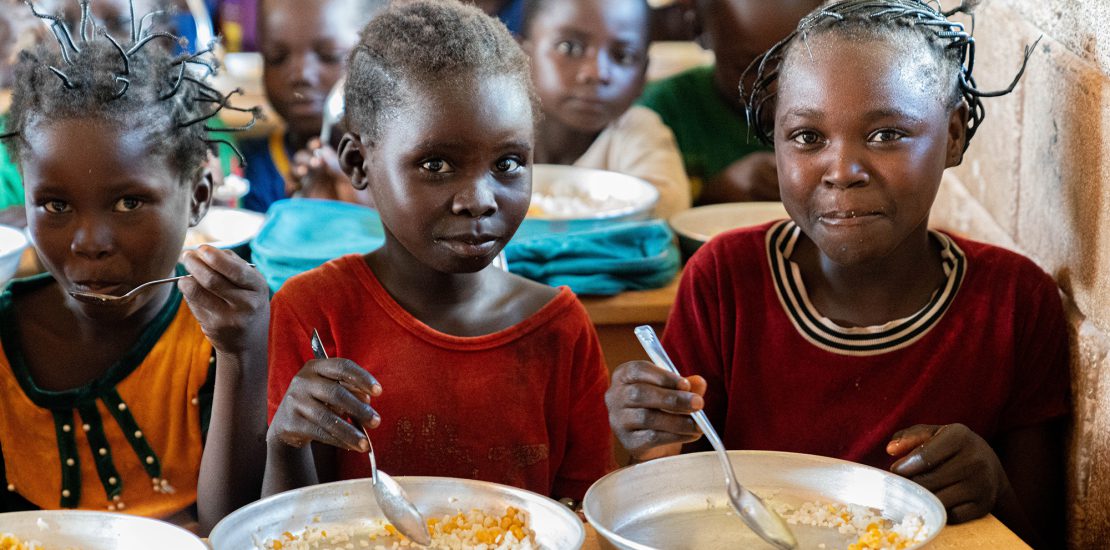
School Feeding Campaign
CEFROHT’s School Feeding Campaign promotes healthy diets in schools by establishing strong regulatory frameworks and effective implementation systems. The campaign advocates for government-led provision of safe, nutritious, and culturally appropriate meals in all learning institutions—not as a privilege, but as a legal obligation rooted in the right to adequate food and education.
When school meals are sourced from local agroecological farming systems, they create a sustainable, rights-based link between nutrition, education, and community food production. Prioritizing organically grown, locally sourced food supports children’s health and learning while strengthening local food economies—particularly for women and smallholder farmers. This approach lays the foundation for lifelong access to safe and nutritious food while institutionalizing school feeding as a key component of national food and nutrition policy.
The Problem
School meals and food environments play a critical role in children’s education and human capital development by shaping dietary habits, which influence immediate and long-term nutrition and health outcomes. Nutrition is the cornerstone of optimal growth during childhood and adolescence.
In Uganda, up to eight million children attend school, yet the majority go hungry—only 33% receive meals at school. This negatively impacts cognitive development, academic performance, and achievement. According to the Uganda Bureau of Statistics, 66% of primary-level learners do not eat at school.
A Cabinet memo from the Ministry of Education and Sports identified hunger as a leading cause of poor academic performance, noting that hungry children struggle with concentration, mental abilities, attendance, behavior, and overall health, often leading to school dropouts.
Schools, as centers of learning and development, have a responsibility to foster healthy eating habits. However, millions of children worldwide are not reaching their full growth potential, with rising delays in cognitive, linguistic, social, and emotional development. These delays have profound long-term health implications.
Poor nutrition and unhealthy diets diminish outcomes for children and adolescents and are major risk factors for mortality and morbidity. Schools provide an ideal setting to implement interventions addressing malnutrition. Effective school food and nutrition policies must encompass the school community, curriculum, food environment, and health services. Comprehensive policies can significantly improve nutrition and address school feeding challenges.
Studies show that Ugandan children consume energy-dense, nutrient-poor foods with insufficient fruits, vegetables, and whole grains—while others go hungry. The Global Nutrition Report highlights that nearly one in three children globally suffers from undernutrition or overweight, reflecting a double burden of malnutrition. These trends are exacerbated by Uganda’s parent-led school feeding guidelines, which fail orphans and children whose parents rely on ultra-processed foods.
Additionally, one in five child and adolescent deaths is linked to diet-related non-communicable diseases (NCDs), driven by behaviors established early in life. The rise of ultra-processed foods (UPFs)—high in sugar, unhealthy fats, and salt—poses a major challenge. Diets rich in these substances contribute to NCDs like cancer, obesity, and hypertension. Approximately 70% of premature adult deaths stem from health behaviors formed in childhood.
Malnutrition has severe consequences for Uganda’s future. Undernutrition leads to stunted growth, impaired cognition, and higher infection susceptibility, while overnutrition and poor diets fuel the growing prevalence of NCDs among adolescents and adults.
School as a Key Setting for Nutrition and Learning
Schools are not just academic centers but also crucial platforms for shaping lifelong dietary habits and public health. CEFROHT’s School Feeding Campaign leverages this role to advance healthy diets through supportive regulations and implementation systems. Recognizing childhood and adolescence as critical developmental stages, the campaign addresses malnutrition—whether from undernutrition or ultra-processed foods.
Many schools are flooded with unhealthy, salt-, sugar-, and fat-laden options, leaving children vulnerable to stunting, weakened immunity, poor academic performance, and future NCD risks. Our campaign transforms these environments through policy reform, advocating for national guidelines mandating nutritious, locally sourced, agroecological meals.
At its core, the campaign institutionalizes school meals as a right—not a privilege—backed by government policies and accountability mechanisms. We push for regulations ensuring school food is safe, diverse, culturally relevant, and sustainably produced. By linking feeding programs to smallholder farmers and women-led agroecological enterprises, we strengthen food systems, empower local producers, and guarantee meal quality.
The campaign’s impact is systemic: reducing hunger, improving concentration and academic performance, and promoting dignity by ensuring all children access healthy meals. It also boosts economic resilience by creating stable markets for farmers and enhances sustainability by reducing reliance on long-distance food chains and chemical-intensive agriculture.
Ultimately, this initiative fosters a generation of nutritionally secure, health-conscious learners while embedding school feeding into Uganda’s national food and nutrition policies—ensuring healthy diets through law, systems, and shared accountability.
School Feeding Campaign
Purpose
CEFROHT’s School Feeding Campaign promotes healthy diets in schools by establishing strong regulatory frameworks and effective implementation systems. The campaign advocates for government-led provision of safe, nutritious, and culturally appropriate meals in all learning institutions—not as a privilege, but as a legal obligation rooted in the right to adequate food and education.
When school meals are sourced from local agroecological farming systems, they create a sustainable, rights-based link between nutrition, education, and community food production. Prioritizing organically grown, locally sourced food supports children’s health and learning while strengthening local food economies—particularly for women and smallholder farmers. This approach lays the foundation for lifelong access to safe and nutritious food while institutionalizing school feeding as a key component of national food and nutrition policy.
The Problem
School meals and food environments play a critical role in children’s education and human capital development by shaping dietary habits, which influence immediate and long-term nutrition and health outcomes. Nutrition is the cornerstone of optimal growth during childhood and adolescence.
In Uganda, up to eight million children attend school, yet the majority go hungry—only 33% receive meals at school. This negatively impacts cognitive development, academic performance, and achievement. According to the Uganda Bureau of Statistics, 66% of primary-level learners do not eat at school.
A Cabinet memo from the Ministry of Education and Sports identified hunger as a leading cause of poor academic performance, noting that hungry children struggle with concentration, mental abilities, attendance, behavior, and overall health, often leading to school dropouts.
Schools, as centers of learning and development, have a responsibility to foster healthy eating habits. However, millions of children worldwide are not reaching their full growth potential, with rising delays in cognitive, linguistic, social, and emotional development. These delays have profound long-term health implications.
Poor nutrition and unhealthy diets diminish outcomes for children and adolescents and are major risk factors for mortality and morbidity. Schools provide an ideal setting to implement interventions addressing malnutrition. Effective school food and nutrition policies must encompass the school community, curriculum, food environment, and health services. Comprehensive policies can significantly improve nutrition and address school feeding challenges.
Studies show that Ugandan children consume energy-dense, nutrient-poor foods with insufficient fruits, vegetables, and whole grains—while others go hungry. The Global Nutrition Report highlights that nearly one in three children globally suffers from undernutrition or overweight, reflecting a double burden of malnutrition. These trends are exacerbated by Uganda’s parent-led school feeding guidelines, which fail orphans and children whose parents rely on ultra-processed foods.
Additionally, one in five child and adolescent deaths is linked to diet-related non-communicable diseases (NCDs), driven by behaviors established early in life. The rise of ultra-processed foods (UPFs)—high in sugar, unhealthy fats, and salt—poses a major challenge. Diets rich in these substances contribute to NCDs like cancer, obesity, and hypertension. Approximately 70% of premature adult deaths stem from health behaviors formed in childhood.
Malnutrition has severe consequences for Uganda’s future. Undernutrition leads to stunted growth, impaired cognition, and higher infection susceptibility, while overnutrition and poor diets fuel the growing prevalence of NCDs among adolescents and adults.
School as a Key Setting for Nutrition and Learning
Schools are not just academic centers but also crucial platforms for shaping lifelong dietary habits and public health. CEFROHT’s School Feeding Campaign leverages this role to advance healthy diets through supportive regulations and implementation systems. Recognizing childhood and adolescence as critical developmental stages, the campaign addresses malnutrition—whether from undernutrition or ultra-processed foods.
Many schools are flooded with unhealthy, salt-, sugar-, and fat-laden options, leaving children vulnerable to stunting, weakened immunity, poor academic performance, and future NCD risks. Our campaign transforms these environments through policy reform, advocating for national guidelines mandating nutritious, locally sourced, agroecological meals.
At its core, the campaign institutionalizes school meals as a right—not a privilege—backed by government policies and accountability mechanisms. We push for regulations ensuring school food is safe, diverse, culturally relevant, and sustainably produced. By linking feeding programs to smallholder farmers and women-led agroecological enterprises, we strengthen food systems, empower local producers, and guarantee meal quality.
The campaign’s impact is systemic: reducing hunger, improving concentration and academic performance, and promoting dignity by ensuring all children access healthy meals. It also boosts economic resilience by creating stable markets for farmers and enhances sustainability by reducing reliance on long-distance food chains and chemical-intensive agriculture.
Ultimately, this initiative fosters a generation of nutritionally secure, health-conscious learners while embedding school feeding into Uganda’s national food and nutrition policies—ensuring healthy diets through law, systems, and shared accountability.
-
Experts sound alarm over industrial trans fatty acids
KAMPALA – As Uganda grapples with a surging crisis of non-communicable diseases, health experts and civil society organizations are intensifying the push for strict regulations on industrially produced trans fatty acids (iTFAs). Often hidden in cheap cooking oils, margarines, street foods, confectioneries and other packaged snacks, these invisible killers are now being linked to a
January 29, 2026 -
East African Crude Oil Pipeline (EACOP) Case and the Fight for Justice
Introduction The East African Crude Oil Pipeline (EACOP) is one of the most ambitious infrastructure projects ever undertaken in the East African region. Crossing Uganda and Tanzania, the project is designed to facilitate the export of crude oil from the Albertine region to the Indian Ocean. Beyond the economic growth of East Africa, EACOP carries
December 24, 2025 -
EALA Commits to Pass an Agroecology Law for East Africa
The East African Legislative Assembly (EALA) has taken a major step toward transforming East Africa’s food systems through its commitment to pass an Agroecology Bill for East Africa. The high-level engagement was organized at the request of EALA leadership and led by the Center for Food and Adequate Living Rights (CEFROHT) in collaboration with a
December 24, 2025 -
The East African Legislative Assembly Convenes in Uganda to Advance an Agroecology Policy and Law in East Africa
Across the East African Community, the agricultural and food systems are facing mounting pressure. Climate shocks ranging from prolonged droughts to unpredictable rainfall continue to erode productivity and expose millions to food insecurity. Soil degradation, loss of biodiversity, and growing dependence on costly synthetic inputs are weakening the resilience of smallholder farmers who form the
November 28, 2025





